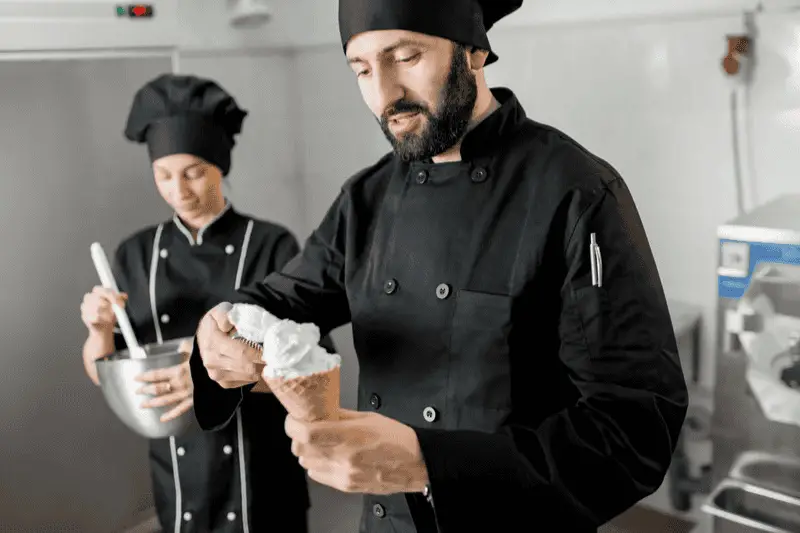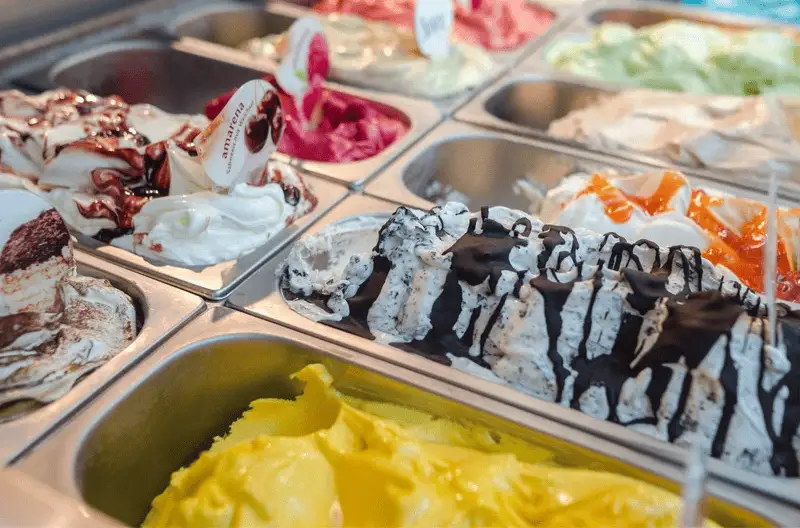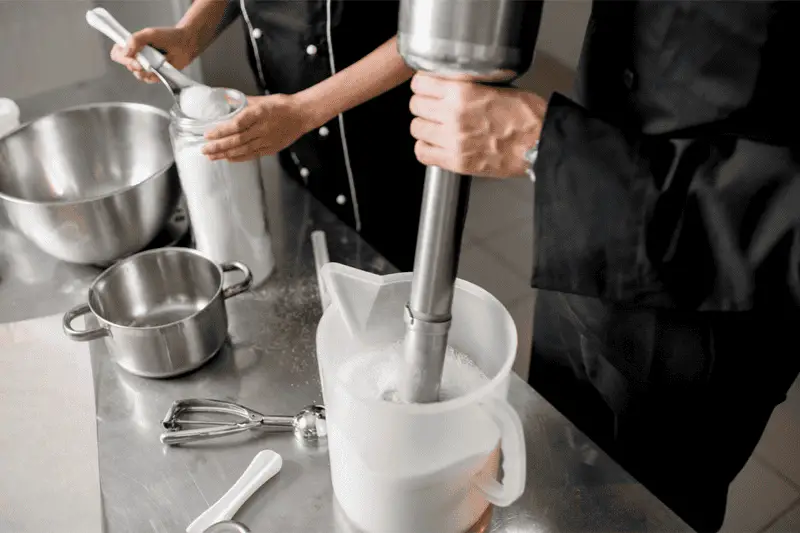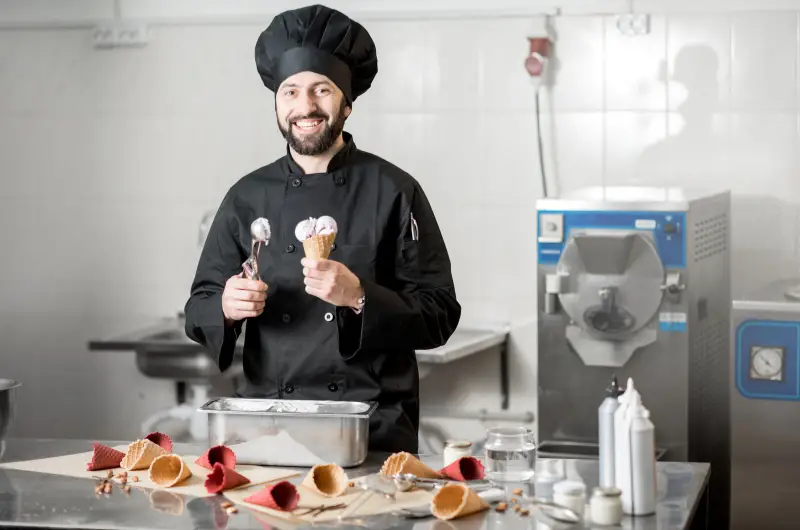Although ice cream making is often part of a pastry chef’s repertoire of skills, there are times when a pastry chef may want to specialise in it wholly.
This article is for pastry chefs or anyone wishing to pursue an ice cream-making career. It is part of a series of articles on a career in ice cream making. The guidance compiled is based on extensive research on the ice cream-making industry.
This article explains what an ice cream chef is and does, followed by an article about how to become one.
Describing the Ice Cream Chef.
Before becoming an ice cream chef, you must understand what an ice cream chef is. The notes below describe and answer frequent questions about the ice cream chef.
What is an Ice Cream Chef?
An ice cream chef also called a gelato or frozen dessert chef, is a culinary expert who creates a variety of ice cream, gelato, sorbet, and other frozen desserts. They’re skilled in crafting unique flavours, perfecting texture, and using the science of freezing and churning to make quality frozen treats.
Ice cream chefs want to provide customers with a delightful ice cream experience, so they constantly experiment with different ingredients to create new flavours of their ice cream.

What is an Ice Cream Chef Called?
An ice cream chef can be referred to by various titles depending on the context and their specific role within the culinary industry. Some standard titles include:
Gelato Chef: This title is often used for chefs who specialise in making gelato, an Italian-style frozen dessert with a smoother texture and denser consistency than traditional ice cream and typically lower in fat content.
Frozen Dessert Chef: This title encompasses chefs specialising in various frozen desserts, including ice cream, gelato, sorbet, frozen yoghurt, and more.
Ice Cream Maker: This title emphasises the chef’s role in producing and creating ice cream, typically in a commercial or artisanal setting.
Regardless of the specific title, ice cream chefs are culinary professionals who are skilled in the art and science of creating delicious frozen treats.
The Difference between Ice Cream and Gelato.
Ice cream and gelato are variations of frozen desserts. Ice cream is the American name for this frozen treat, and gelato is the Italian name. The main differences are that ice cream has more air and fat content and is served at a lower temperature; gelato has less and is served at a higher temperature.
These differences give ice cream a rich, full, creamy taste and gelato a lighter, cleaner, but more intense taste. Gelato’s more intense flavour is because fat tends to coat the tongue and inhibits tasting the full flavour. Hence, gelato tastes more intense as it contains less fat than ice cream. These differences do not make one better than the other. What you prefer is more a matter of individual preference.
This table highlights the differences between ice cream and gelato regarding ingredients, texture, flavour, and serving methods:
| Feature | Ice Cream | Gelato |
|---|---|---|
| Base Ingredients: | Made with cream, milk, and sugar | Made with milk, sugar, and sometimes a small amount of cream or egg yolks |
| Egg: | It may contain egg or egg yolks | It rarely contains eggs |
| Fat Content: | Typically higher fat content (10-16%) | Typically lower fat content (4-8%) |
| Churning Method: | Churned at a faster speed | Churned at a slower speed |
| Air Incorporation (Overrun): | Higher air overrun (50-60%) results in a lighter texture | Lower air overrun (15-30%) results in a denser, creamier texture |
| Serving Temperature: | Served at a colder temperature | Served at a slightly warmer temperature |
| Flavour Intensity: | Flavours can be less intense due to higher fat content that gives rich, creamy, velvety mouth feel | Flavours tend to be more intense due to lower fat content |
| Texture: | Creamy and smoothy | Dense and silky-smooth |
| Origin: | Originated in the United States or Europe | Originated in Italy |

What are the Qualifications for an Ice Cream Chef?
The qualifications for an ice cream chef are specialised training and experience in ice cream-making techniques, flavour forming and production means, and a solid baking and culinary base. Passion, creativity, detail orientation, communication, teamwork, and equipment and food safety knowledge are also vital.
To learn how to become an ice cream chef, read our article.
Is Ice Cream Tasting a Job?
Ice cream tasting is, in fact, a real job. Ice cream-tasting experts have titles like flavouroligists, toastmasters, sensory analysts, and food scientists. They taste ice cream to evaluate its colour, texture, flavour, smell, and quality against recognised standards.
This feedback helps ensure that ice cream products meet established taste, consistency, and customer satisfaction standards.
Some speciality shops, restaurants, or ice cream manufacturers may employ professional taste testers or sensory analysts to provide feedback on new flavours or products before they are introduced to the market. Ice cream tasters can earn up to $100,000 a year.
Read more about this role in our article on where to work as an ice cream chef.
The Role of an Ice Cream Chef vs a Pastry Chef.
Ice cream chefs typically work as specialised professionals in creating and producing ice cream and frozen desserts, focusing solely on this area. They often work in ice cream shops.
On the other hand, pastry chefs have a broader role that includes producing pastries, cakes, various baked goods, and hot and cold desserts, which may consist of ice cream as one of their responsibilities, especially for those working in restaurants or hotels. Pastry chefs may sometimes have to supplement their training if it does not include ice cream work when working in establishments where they must fulfil this role.
Similarly, those ice cream chefs who started their training as pastry chefs and working in restaurants that offer pastries, baked goods, desserts, and frozen treats can also be asked to fulfil pastry-related roles in addition to their ice cream roles.
To learn more about the pastry chef role, read our article.
The Duties and Responsibilities of an Ice Cream Chef.
The duties and responsibilities of an ice cream chef can vary depending on where they work. Essentially, their duties focus on ice cream-making operations and maintaining food hygiene standards.
The typical responsibilities of an ice cream maker include:
Making Ice Cream to the Highest Standard.
An ice cream chef may work alone and be responsible for the production process or with others. Their role can include ingredient preparation, mixing, churning, and freezing to ensure that high-quality ice cream is made.
Designing New and Innovative Ice Cream Flavours.
An essential part of an ice cream chef’s role is developing new recipes and flavours, although fine-tuning existing recipes to ensure quality and consistency is also important.
Ice cream chefs continuously experiment with new ingredients, techniques, and presentations to design new ice cream flavours and recipes, keeping the menu fresh and exciting for customers.

Checking Quality of Ingredients, Texture and Flavour.
As quality control is essential, ice cream makers must also monitor the quality of ingredients and the finished ice cream’s texture, flavour, and appearance to ensure that it meets established standards.
Maintain And Clean Ice-Cream-Making Equipment.
Ice cream chefs are responsible for maintaining and cleaning ice cream-making equipment, such as ice cream machines and freezers, to ensure optimal performance and hygiene.
While this may be a less pleasant part of the job, it is vital to ensure that machines function optimally and to protect customers’ health.
Sourcing and Maintaining Ingredient Levels.
As quality ingredients make good ice cream, ice cream makers must source high-quality ingredients from reputable suppliers.
They must also monitor inventory levels of ingredients and supplies, ordering and restocking as needed to prevent shortages for daily operations,
Working with the Culinary Team to Develop Menus.
Working as an ice cream maker also means meeting with management or other culinary team members to collaborate and develop menus, seasonal or speciality ice cream flavours, or new products to keep the ice cream selection fresh and appealing to customers.
Interact and Deal with Customer Concerns.
An ice cream chef may have to interact with customers to provide information about ice cream flavours, answer questions, and ensure a positive dining experience.
Training and Supervising Staff involved in Ice Cream Making.
Depending on the size of the ice cream shop or establishment, an ice cream chef’s role can also include training and supervising staff members involved in ice cream production, ensuring they adhere to recipes, procedures, and hygiene standards.
Following Food Safety and Sanitation Practices.
While this may be another less pleasant part of their job, an ice cream maker must ensure compliance with local health and safety regulations and maintain proper sanitation practices in the kitchen and production areas.
This is necessary to ensure quality ice cream that is safe to eat and to protect the establishment’s reputation.
Skills and Qualities to Be a Successful Ice Cream Chef.
The skills and qualities needed for an ice cream chef can vary depending on the specific role and employer and include a combination of technical or hard and soft or personal skills. Still, several typical qualifications and requirements may include:
A Solid Knowledge and Experience of Ice Cream Making.
An ice cream maker must master the ice cream-making process from start to finish, from purchasing raw materials, churning, mixing, pasteurising, packaging, displaying products, and serving customers.

A Base Baking and Culinary Knowledge to Create Flavours.
A strong foundation in culinary techniques, including knowledge of ingredient properties, flavour pairing, and recipe development, is crucial for creating delicious and balanced ice cream flavours.
To create complementary flavours and textures, they must also understand bakery products, including cakes, pastries, and other desserts.
Knowledge of Equipment for Efficient Production.
Familiarity with ice cream-making equipment, including batch freezers, churners, and storage facilities, is essential for efficient production and maintenance.
Implementing Food Safeties for Quality and Client Safety.
Understanding and implementing proper food safety and hygiene practices are crucial to ensuring consumers’ safety and quality of ice cream products.
Business Acumen to Operate an Ice Cream Business.
Ice cream chefs operating their own businesses or in menu development may benefit from basic business knowledge, including cost control, menu pricing, and marketing strategies.
Passion for Ice Cream for Dedication and Craft Excellence.
A genuine passion for ice cream and frozen desserts is fundamental, as it drives creativity, dedication, and a commitment to excellence in every aspect of the craft.

Patience And a Willingness to Learn and Grow with Time.
To become a skilled and successful ice cream maker, you must be patient and allow yourself time to learn. Becoming an expert often means starting small and putting in the effort over time so that your expertise grows.
Creativity, Innovation and Willingness to Experiment.
These are amongst the top personal qualities an ice cream maker must have as they constantly experiment with new flavour combinations to create original frozen desserts.
In addition to serving house flavours, ice cream chefs often need to surprise their clientele with new and unexpected flavours.
A Refined Palate for Tasting Ice Cream.
Ice cream makers often design new flavours, so a discerning palate must test them and evaluate the latest ice cream’s taste, flavour, texture, and overall quality.
Resilience For Failed Flavours to Business Issues.
Ice cream makers often design and test new flavours, which may not always be well received. Remaining resilient in the face of this feedback and bouncing back to improve the flavour or start all over again requires resilience.
Aspects of the work can be demanding and challenging, requiring perseverance through setbacks, learning from failures, and maintaining a positive attitude in the face of adversity.
Attention to Detail to Ensure High-Quality Ice Cream.
Attention to detail is necessary for ice cream making. Ingredients need to be carefully measured, and freezing times and texture consistency need careful monitoring to ensure high-quality frozen desserts ultimately.
A Work Ethic of Pride, Diligence, Discipline And Hard Work.
Employers of ice cream or gelato parlours want ice cream makers who take pride in their work and the ice cream they produce, ensuring it meets the highest standards.
This, in turn, requires a high-standard work ethic of dedication, discipline, and hard work, from doing prep work, working with ingredients and making ice cream correctly to following safety and cleaning procedures and doing paperwork.
Teamwork and Collaboration for Result.
Ice cream chefs often work as a team in restaurant kitchens, ice cream shops, or catering operations. They require effective communication, cooperation, and teamwork to deliver exceptional results.
Time Management to Meet Demand and Quality.
Managing production schedules, ingredient preparation, and freezing times efficiently is essential to meet demand and maintain product quality in a fast-paced kitchen environment.
A Customer Focus to Create a Good Experience.
For chefs working in settings with direct customer interaction, strong communication and customer service skills are essential for providing an enjoyable and memorable ice cream experience.
Such chefs must also be able to deal with clients’ concerns and issues and effectively resolve them.

Lifelong Learning to Embrace Changes and Trends.
The ice cream industry is ever-evolving, so a willingness to learn about new techniques, ingredients, and trends is essential for staying competitive and innovative.
This may mean, for example, following developments in gastronomy or clients’ changing dietary preferences to create frozen desserts to meet their needs.
An Entrepreneurial Orientation (if applicable).
Entrepreneurial orientation is necessary for ice cream chefs who want to own businesses. It encompasses business acumen, strategic thinking, and a willingness to take calculated risks to achieve success.


